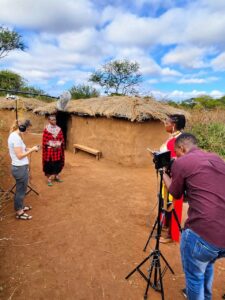Jenga films impacts lives
By Jacob Mugendi
 John Karanja took four years studying for a bachelor’s degree only to realize he did not need one to become a filmmaker. The skills he needed were not taught in class, but learned in the streets through working with other people. Now, a decade later, John has found his niche as the owner and co-founder of Jenga Films, a multimedia company that uses video to tell stories and impact lives.
John Karanja took four years studying for a bachelor’s degree only to realize he did not need one to become a filmmaker. The skills he needed were not taught in class, but learned in the streets through working with other people. Now, a decade later, John has found his niche as the owner and co-founder of Jenga Films, a multimedia company that uses video to tell stories and impact lives.
Starting out
Jenga Films started with what John calls a divine encounter during a short-term mission organized by the Centre for Mission Mobilization. On the trip, a friend introduced him to Neil Sandoz, a missionary who helped John to kickstart his filmmaking career and later co-founded Jenga Films. Although John had a background in theatre arts and film technology, his encounter with Neil gave him the hands-on skills and exposure.
One of their first jobs was a documentary for an organization that was rescuing pregnant girls in the slums. It introduced him to mission-related filming; but afterwards, similar opportunities were scarce and he struggled to make ends meet.
Power of filmmaking
A turning point came when Jenga Films did a documentary for an organization that offered trauma counselling for kids. Through the video, the organization created awareness and raised more funds, enabling them to secure a bigger space, hire more people, and counsel more kids. It was an opportunity to see his work directly transform lives, and this was his goal.
To date, Jenga Films has worked on many projects with the clear result of reaching many people and transforming organizations. He recently did a documentary for an organization supplying water filters to remote communities in Kenya. It is not easy for partners and other people who are not on the ground to tell the impact of such work. However, in a documentary, viewers see and hear people talk about falling sick from drinking contaminated water and how that has stopped because of the filters.
John believes that missionaries and ministries need to tap the power of multimedia to tell their stories and connect with partners. It is one thing to read a report and another to see the people who have been impacted by someone’s support. Videographers can help bridge the gap between field workers, their sending organizations, and the partners who support them. Video stories also enhance accountability because of the visual confirmation.
Challenges for videographers
Videographers face many challenges. John says that those who acquire all the funds needed before starting a project can plan their activities well. In his case, he depends on payments from interested clients to meet his needs, and this affects his work when projects are few.
Since many Christian organizations do videos at the end of the year, he is usually inundated with offers, but cannot take on all of them because shooting and editing are time-consuming. Some people do not see the value of video documentaries and are unwilling to engage videographers to tell their stories. Others are reluctant to pay a decent fee to cater for filmmaking expenses, mainly because they don’t understand what goes into making a compelling video. A five-minute documentary could involve interviewing 15 people, hours of editing and searching for good music, and take up to two weeks to finish!
Use media
In this era of high media consumption, John encourages believers to use media for greater impact. It may be as simple as sharing a photo or video with partners. This is more appealing than the usual PDF newsletter. Those without advanced media skills can use free apps on smartphones to aid editing. “You can take a long time explaining to people what you do, but a video or a photo will do it in seconds,” John shares. He advises those planning to venture into filmmaking to find professionals who can mentor them. Learning is hands-on; hence, apprenticeship is key to learning the ropes.
